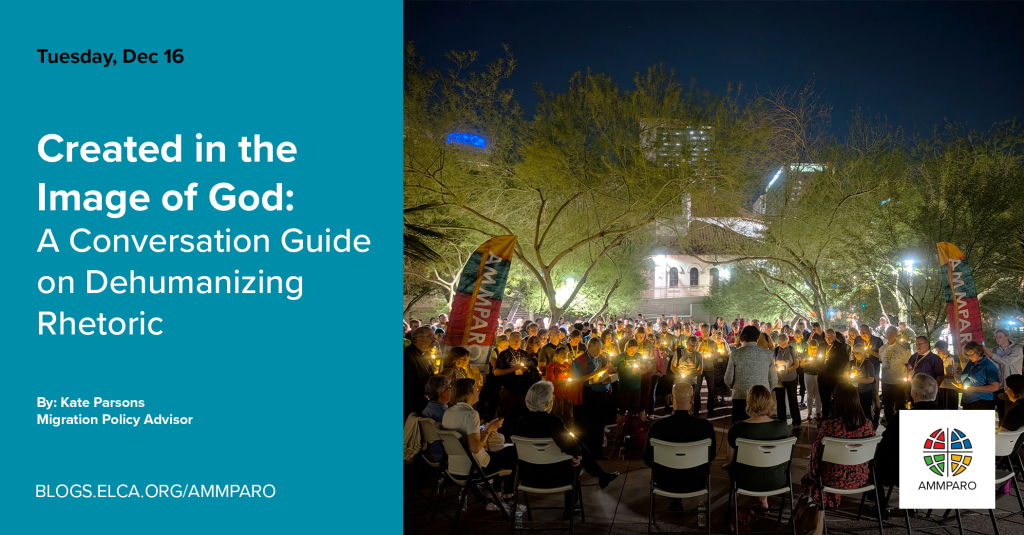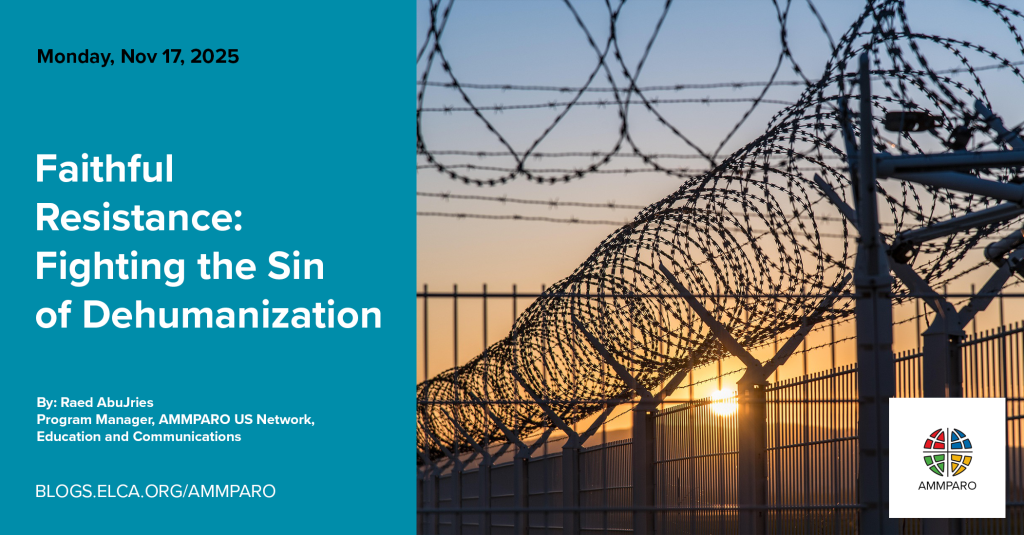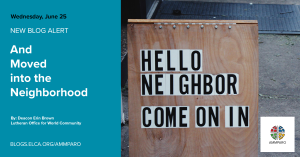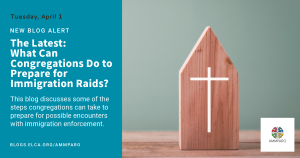By Giovana Oaxaca
World Refugee Day is observed annually on June 20th.
This is a time to honor the courage and resilience of refugees worldwide. Because of growing displacement due to conflict, climate change, and insecurity around the world, it’s more important than ever before to raise awareness about the plight of refugees, to advocate for justice, and to show solidarity with refugees and those seeking legal recognition as refugees, such as asylum seekers.
You can show solidarity with refugees by expressing that you believe in a world where refugees are welcomed. “I was a stranger and you welcomed me,” (Matthew 25:35) powerfully underscores biblical call to show hospitality. Lutherans have a long history of extending hospitality to refugees, having welcomed and assisted refugees through resettlement agencies for almost a century. The work of welcome continues.
Since the 2016 adoption of the ELCA Accompanying Migrants with Protection, Advocacy, Representation, and Opportunities (AMMPARO) strategy, more individuals have gotten involved in the work of welcome as Welcoming Congregations. Across the country, there are 254 welcoming and sanctuary congregations and 35 synods with organized groups involved in AMMPARO. Altogether, there is activity involving accompaniment in 59 of the 65 synods in the ELCA. Significant developments around the world served as a catalyst for AMMPARO to connect globally with ELCA companions and partners to further accompany, protect, and advocate for migrants, displaced people, and refugees living outside of the Western Hemisphere.
Legacies of Welcome
At the base of the Statue of Liberty lies an inscription that reads as a statement of the nation’s values. “Give me your tired, your poor, your huddled masses yearning to breathe free,” Emma Lazarus’ poem created a contrast to a sentiment of exclusion and prejudice against people from other countries that was manifest in anti-immigrant legislation adopted in those times. Emma’s poem was dedicated to the Statue of Liberty just a year after the Chinese Exclusion Act was passed in Congress, becoming the first federal law that limited immigration from a particular nationality.
This year marks the 100-year anniversary of the Johnson-Reed Act of 1924. The Johnson-Reed Act, or National Origins Act, severely limited immigration through percent country quotas that strongly favored Northern Europeans, disfavored Eastern and Southern Europeans, and excluded Asians for immigrant visas entirely. The 1924 law, writer Jia Lynn Yang says, changed the country forever. Anti-immigrant sentiment and xenophobia fueled a strong attention to preserving the United States’ ethnic and racial homogeneity. At its essence, this is what the 1924 law did. The parallels with the rhetoric used then, and the rhetoric used today to justify restrictions, often by individuals who lack a comprehensive understanding of the arduous journey it takes to emigrate ‘the right way,’ are deeply concerning.
The 1924 quotas remained unchanged even as Jewish refugees, and other minorities, began fleeing Nazi persecution. The Jewish passengers of the M.S. St. Louis, desperate to find sanctuary in 1939, were refused by the United States under the system of quotas and forced to sail back to Europe.
The Displaced Persons Act of 1948 was eventually passed, for there was growing concern about displacement of people of all faiths from Europe. The Displaced Persons Act of 1948 worked by borrowing against future quota allocations. American Lutherans, other Christians, and Jewish Americans played a key part in appealing to President Truman to pass this law.
Refugees did not gain distinct international legal recognition until the United Nations adopted the 1951 Convention Relating to the Status of Refugees. The convention created a new international legal framework to define and protect the rights of refugees. The convention defined a refugee as, “a person who owing to a well-founded fear of being persecuted for reasons of race, religion, nationality, membership of a particular social group or political opinion, is outside the country of his nationality and is unable or, owing to such fear, is unwilling to avail himself of the protection of that country; or who, not having a nationality and being outside the country of his former habitual residence as a result of such events, is unable or, owing to such fear, is unwilling to return to it.” The U.S. was not a signatory, but later joined the 1967 protocol which together with the 1951 convention, form the basis of refugee protection to this day. Watch this Video Explainer to understand who refugees are.
While the national origins quotas were done away with in 1965 and replaced with higher visa caps with priority given to family and skills-based immigration, the passage of the Immigration and Nationality Act that ushered this change was the culmination of robust civic dialogue and intense geopolitical pressures. The civil rights movement was highly influential in the American public rejecting ethnic and racial discrimination. Furthermore, internationally, the U.S.’s restrictionism was more and more at odds with foreign policy objectives.
It was not until passage of the 1980 Refugee Protection Act, however, that U.S. efforts to resettle refugees became systematized and formally aligned with international frameworks. The Refugee Protection Act established the U.S. Refugee Admissions Program (USRAP).
To this day, very few people understand how the immigration system came to be, much less the important victories that won the refugee protections we have now. Or consider the enduring legacy of hospitality woven throughout U.S. history. Fewer understand that it is mostly major pieces of legislation, passed in the 1990’s, that undergird most modern immigration discourse. This makes it even more important to vigorously defend refugee protection and champion immigration reforms that bring the immigration system into alignment with the principles of fairness and generosity (ELCA Social Message on Immigration, Pg. 7)
Everyday individuals continue heeding the call to welcome. Welcoming new neighbors has opened new channels of dialogue, raised mutual awareness of each other, and fostered a deeper sense of community. Were it not for the bold steps of the leaders before us, the U.S. would not be a place where, centuries on, the Statue of Liberty still stands as a beacon of hope and opportunity.
Learn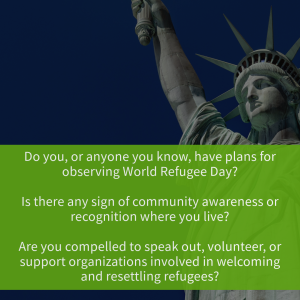
Broadening our shared awareness of the challenges faced by those displaced from their homes leads to more effective support and advocacy. The UNHCR’s Global Trends Report indicates that at the end of 2023, an estimated 117.3 million people worldwide were forcibly displaced due to persecution, conflict, violence, human rights violations and events seriously disturbing the public order. Based on projections, the number of displaced is likely to have exceeded 120 million by the end of April 2024.
Listen to the podcast series “Living as Neighbors” shared by the Lutheran World Federation amplifying stories of welcome.
In their own words, these refugee storytellers recall their memories of home, reflect on what solidarity means to them, and share their dreams:
The news of people seeking asylum at the southern border dominates the headlines. Who are they? These are individuals who have a legal and human right to seek asylum.
- Read this fact-sheet to understand the basics of asylum and who asylum seekers are.
- Since May 2024, a slate of new policies and legislative proposals have threatened the legal and human right to seek asylum. Read this briefing about the latest asylum restrictions.
Advocate
Supporting generous refugee and immigration policies responds to the biblical call to seek justice, peace, and protection for all of God’s people, including those uprooted from their homes. Take Action by calling on your elected representatives to support:
- The Afghan Adjustment Act: This bipartisan bill would provide stability and security to Afghans in the United States. Take Action here.
- The Asylum Seeker Work Authorization Act: This bill would help asylum seekers meet their basic needs while their asylum claims are adjudicated. Take Action here.
- Robust Refugee and Immigration Funding Next Year: In Fiscal Year 2025 Congress must robustly fund domestic and overseas programs that promote stability and human dignity and expand U.S. communities’ capacity to successfully welcome refugees and other newcomers. Accounts such as Refugee and Entrant Assistance (REA) account and the Migration and Refugee Assistance (MRA) are essential to expanding this capacity. Funding for the International Disaster Assistance account (IDA) is key to save lives and prevent internally displaced people from needing to flee their home countries and become refugees.
- Join the Welcoming Refugees 2025 campaign to show welcome to refugees by asking your local or state elected leaders to support a robust refugee admissions goal. Join the campaign here.
Share Your Story
Share a video, quote, or audio message about your experience being welcomed to the U.S. and how you are working to make your community more welcoming and inclusive for others. Raed AbuJries, AMMPARO program manager for U.S. Network, education, and communications shares an example of a transformative immigration experience being an immigrant from the occupied West Bank to the United States. Read his story here.
Pray
Pray for justice for refugee and migrant children and families. Here are some examples.
